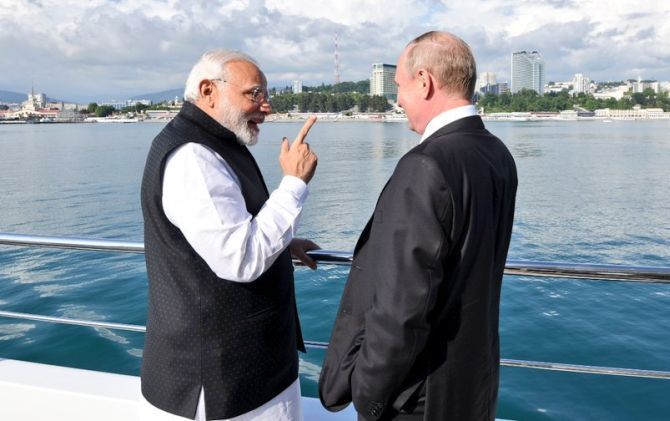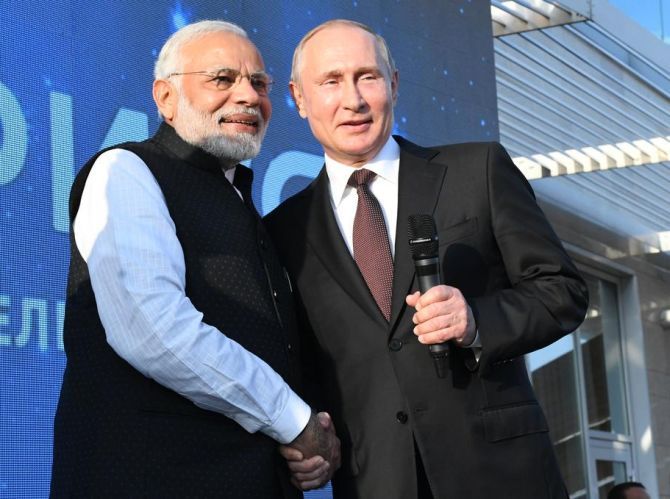 | « Back to article | Print this article |
Modi said friendship between India and Russia has stood the test of time and their ties will continue to scale newer heights in the coming years.
All Photographs: Courtesy Ministry of External Affairs, India

Prime Minister Narendra Modi on Monday said he had ‘extremely productive’ discussions with Russian President Vladimir Putin and they reviewed the complete range of India-Russia relations as well as global issues and underlined the need for a multi-polar world during their first ever informal summit in the Black Sea coastal city of Sochi.
Modi said friendship between India and Russia has stood the test of time and their ties will continue to scale newer heights in the coming years.
He said the seeds of the 'strategic partnership' sown by former prime minister Atal Bihari Vajpayee and President Putin have now grown into a ‘special privileged strategic partnership’ which is a ‘very big achievement’ in itself.

“I am grateful to President Putin who invited me for an informal meeting and hence, in the long friendship of ours, this is a new aspect that has been attached to our relationship,” Modi said.
“You have added a new aspect of informal summit in the bilateral relationship which I think is a great occasion and creates trust,” he said.
Modi and the Russian President also took a boat ride from Bocharev Creek to Olympic Park in Sochi after the informal summit so they can have more time to discuss bilateral ties.

The talks between the two leaders in Putin's Bocharov Ruchei residence lasted for more than three hours.
After the official part, the two leaders continued informal talks. Putin invited Modi for a boat ride, Russia's official news agency Tass reported.
‘Boat ride on the Black Sea! PM @narendramodi and Russian President #Putin had plenty to discuss as they sail together from Bocharev Creek to Olympic Park in #Sochi,’ External Affairs Ministry spokesperson Raveesh Kumar tweeted.

A statement issued by the Ministry of External Affairs said the two leaders agreed that the Special and Privileged Strategic Partnership between India and Russia is an important factor for global peace and stability.
‘They shared the view that India and Russia have an important role to play in contributing to an open and equitable world order. They recognised each other's respective roles as major powers with common responsibilities for maintaining global peace and stability,’ the statement said.
The two leaders held in depth discussions on major international issues and agreed on the importance of building a multi-polar world order, it said.

They decided to intensify consultation and coordination with each other, including on the Indo-Pacific Region.
‘Both leaders expressed their concern over terrorism and radicalisation, and their determination to combat terrorism in all its forms and manifestations. In this context, they endorsed the importance of restoring peace and stability in Afghanistan in an atmosphere free from the threat of terrorism, and agreed to work together towards achieving this objective,’ the statement said.
Modi and Putin held detailed exchange of views on the national development plans and priorities. The two leaders directed their officials to prepare concrete outcomes for the forthcoming Summit in India later this year, the statement said.

They agreed to institute a Strategic Economic Dialogue between NITI Aayog and the Ministry of Economic Development of Russia, to identify greater synergy in trade and investment.
They noted with satisfaction the expanding cooperation in the energy sector and welcomed the arrival of the first consignment of liquefied natural gas under a long-term agreement between Gazprom and Gas Authority of India Limited, next month.
The two leaders also reiterated the significance of longstanding partnership in the military, security and nuclear energy fields and welcomed the ongoing cooperation in these areas.

Modi also thanked Russia for playing a major role in helping India get a permanent membership in the Shanghai Cooperation Organisation.
India and Pakistan were admitted last year into the organisation.
"We are working together on International North-South Transport Corridor (INSTC) and BRICS (Brazil, Russia, India, China, South Africa)," Modi said.
He also congratulated Putin for becoming the President for the fourth time with overwhelming majority.
Welcoming Prime Minister Modi to Sochi, Putin said his visit would give a fresh impetus to bilateral ties.

"We are delighted to see you, Mr Prime Minister, and consider you personally as a big friend of our country. We are very glad to be able to have this meeting," Putin told Modi.
He said Russia and India maintain a high strategic level of partnership, with close cooperation between the two countries' defence ministries.
"Our defence ministries maintain very close contacts and cooperation. It speaks about a very high strategic level of our partnership," Putin said.
He also hailed joint activities of the two countries in the area of foreign politics, in particular within the United Nations, BRICS and the SCO.
"There is no need to explain Russian-Indian relations, since we all know that they have deep roots. However, we have been able to create additional momentum recently. Last year, our trade saw a significant increase, adding another 17 per cent since the beginning of this year," he said.

They later visited the Sirius Educational Centre -- a unique educational centre set up on the initiative of the Russian President, and interacted with more than 700 students.
Talking to students, Modi said he was thankful to his friend President Putin who provided him an opportunity to meet the bright stars of Russia, referring to the students of the centre.
"I was with my friend for the whole day today. When he spoke about the kids (of the centre) he was emotionally involved. I saw dreams in his eyes. I saw a different person. I saw a Putin who was different from the president," Modi said as he held the hand of Putin who was smiling.
He asked the students how many of them were willing to visit India.
In response, all the students raised their hands, bringing a smile on the face of Modi who invited them to visit India and interact with Indian students. He also promised that he will spend time with them in India.
Later, the students took the autographs of the two leaders.

Tass news agency quoted Foreign Minister Sergei Lavrov as saying that the talks were ‘very intense’.
"I am confident that the ongoing informal contacts between the leaders of Russia and India will be useful and will help define the further guidelines for our development and strategic partnership," Lavrov said.
"We discussed the whole spectrum of our particularly privileged strategic partnership," the minister said.
The summit took place amidst the possible impact of the US sanctions against Russia under the Countering America's Adversaries Through Sanctions Act (CAATSA) on Indo-Russia defence cooperation.
The CAATSA is a United States federal law that imposed sanctions on Iran, North Korea, and Russia.
It includes sanctions against countries that engage in significant transactions with Russia's defence and intelligence sectors. India could face US sanctions for purchasing high value military defence items, in particular state-of-the-art S-400 Triumf missile defence system, from Russia under the act.

Later in the evening, Modi left for home with Putin, departing from protocol, came to the airport to see him off.
'Farewell, my friend! In a special gesture symbolising our friendship, Russian President #Putin personally bid farewell to PM @narendramodi at the airport at the conclusion of PM's short but successful visit to Russia,' Raveesh Kumar tweeted.
Before leaving for home, the two leaders visited an incubator for gifted children.